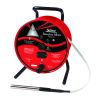Solinst Model 122M Mini Oil/Water Interface Meters
Features
- Sensor accuracy to 1/200 ft or 1.0 mm
- Easy access battery: minimum 300 hours of life
- Certified intrinsically safe
- Free ground shipping
- Expedited repair and warranty service
- Lifetime technical support
- More
Overview
The Solinst Mini Oil/Water Interface Meters give clear and accurate measurements of product level and thickness in wells and tanks. Determination of both light (floating) non-aqueous phase liquids (LNAPL) and dense (sinking) non-aqueous phase liquids (DNAPL) is quick and easy.
Design
The Model 122M Mini Interface Meter with PVDF laser marked cable is a convenient small version, which can easily to fit in a backpack, or an optional custom mini carry case. It uses narrow laser marked PVDF cable, in 80 ft or 25m lengths. The Mini Interface Meter enhanced electronics include automatic circuitry testing; 300 hours of on-time battery life; clear signals; and high accuracy. The circuits are powered by one standard 9V battery housed in easy-access drawer in the faceplate.
Mechanics
The 122M uses the P8 Probe, which is 5/8" in diameter (16mm) and stainless steel construction. It is pressure proof up to 500 psi. The beam is emitted from within a Hydex cone-shaped tip. The tip is protected by an integral stainless steel shield, and is excellent for the vast majority of product monitoring situations. The 0.12" (3mm) coaxial cable has a durable PVDF jacket with permanent laser markings every 1/100 ft. or each millimeter. The cable has a braided copper outer conductor, a stranded stainless steel central conductor, and a smooth chemical-resistant surface that is easy to decontaminate.
In The News
Spring 2025 Environmental Monitor Available Now
In the Spring 2025 edition of the Environmental Monitor, we highlight partnerships across the world and the importance of collaboration between government agencies, universities, environmental groups, local communities, and other stakeholders. From great white shark research in Cape Cod to monitoring fisheries in Lake Erie, this latest edition underscores partnerships that connect stakeholders in a watershed through environmental data. With an emphasis on data sharing, a combination of real-time and discrete sampling keeps the public and partners informed of environmental conditions. Our writers also sought out science professionals dedicated to working with peers within and outside of the environmental sector.
Read MoreMonitoring Mariculture in the Gulf of Alaska
The mariculture industry in the Gulf of Alaska has been steadily growing in recent years, guided by ongoing research to help refine farm location and cultivation practices. A subset of aquaculture, mariculture focuses on rearing organisms in the open ocean. In Alaska, finfish farming is illegal, so most farms cultivate kelp, oysters, or a combination of the two. These small, locally operated farms started popping up in the Gulf of Alaska in the early 1990s, when shellfish farming first became legal. Kelp farming did not begin to catch on in the state until 2016. Many of the coastal areas that have grown interested in mariculture are historically commercial fishing communities.
Read MoreSupplying Seattle’s Drinking Water: Using Data Buoys to Monitor the Cedar River Municipal Watershed
Providing clean, safe, and reliable drinking water for the 1.6 million people in the greater Seattle area is a top priority for Seattle Public Utilities (SPU). With limited water supplies, SPU dedicates considerable resources to maintain its watersheds and mountain reservoirs. About 70 percent of Seattle Water comes from the Cedar River Municipal Watershed , and the other 30 percent comes from the South Fork Tolt River Watershed . [caption id="attachment_39574" align="alignnone" width="940"] Data buoy in Chester Morse Lake . (Credit: Kevin Johnson / Seattle Public Utilities) [/caption] Jamie Thompson, a fisheries biologist at SPU, monitors aquatic ecosystems centered on fish listed under the U.S. Endangered Species Act (ESA).
Read More









